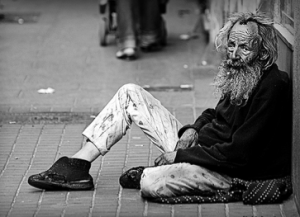In this Article everything stood out to me, but specifically the part in the article where Irina Neressova in the section of the Domestic Architecture says, “The homeless are faced with a reality others avoid recognizing by divorcing themselves from urban space and by providing themselves with a false impression of control by obtaining material signs of wealth and security. Having to face this reality of vulnerability, the homeless demonstrate, for the rest of the people, the inventive nature of endurance.”
It is true as the people in general see what circumstances anyone can end up in, being if there is no money and protection then you will end up on the streets with a higher risk of dying because of the climatic weather, famine, thirst, lack of human contact, being in your own manure, and in more unfortunate situations. Money is not everything, but it is necessary to be able to be okay in this short life in having your own home, in having an education, and in being able to become a professional, but it is not everything. People that have that “false reality of control(…)” in Money, power, and security are never going to be secure, and it is definetly not the reason why we were created to be on this earth, because we can die any day so the security is really non-existent and when we die the money and power will not go with us, by that time you will be judged in your good and bad deeds by our Merciful and Just God.
The homeless show the most fortunate how it can happen to us any day. There is just no real security because any person, any CEO could become unemployed and end up on the street because they could not pay for their house, anyone could have family problems where the children grown up do not care for their older senior parents so they are on the street. There are others that have had harder lives then most where they were abused and ended up in drugs, no one really knows every person’s situation, but those homeless people beg for the outside world to help them. They might demonstrate their “endurance(….)” to us that they have not given up because they actually want to do something with their lives and are trying to survive in these unfortunate states of being so they do not die, and very few that really do not care what happens, BUT in general I know for a fact that these valuable people on the streets are imploring and needing help of every person that is able to buy a sandwich or quickly make one and have groups of people feeding them, giving them advice, and have different centers or rehabilitation buildings made for these people so they can become successful individuals and bring back that self-dignity that was lost as a person, as a child of God, as a human being.
I have been able to observe and personally experience giving the food to these homeless people on the streets in a Religious Community Group, and while it is great to see how thankful they are, it is very heartbreaking seeing how they live and how sad many of them feel when we go, and their tears running down their cheeks. This experience has shown me that many of us are very ungrateful because we always complain about small things or think we have it bad, but no, there are many people that need our help. These homeless people really are in spiritual, emotional, physical, and in psychological need. They want and need our help because they alone are not able to pick their selves up. No human being wants to be on the street.
In Conclusion, I hope people would stop thinking of their own problems all the time, and actually see how many people and organizations need more of our help: homeless people, protection of old people, protection of the babies in the womb, more support for those single mothers, support for those that are abused, guidance in spiritually, more protection for wildlife, etc. All of these things I have listed and the etc. part, need of us.
(Citation)
Nersessova, Irina. “Tapestry of Space: Domestic Architecture and Underground Communities in Margaret’s Morton’s Photography of a Forgotten New York.” DisClosure: A Journal of Social Theory: Vol. 23, Article 3. UK Knowledge, 2014. Web. 23 Jan. 2016. <http://uknowledge.uky.edu/cgi/viewcontent.cgi?article=1025&conte xt=disclosure>.
xt=disclosure>.